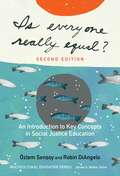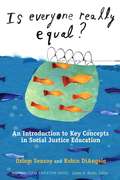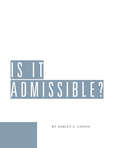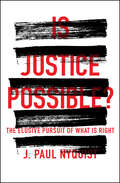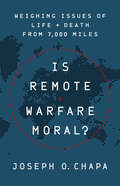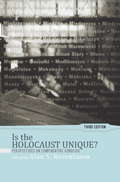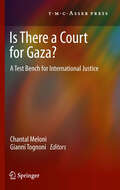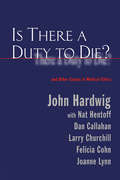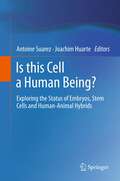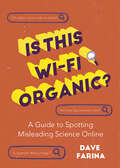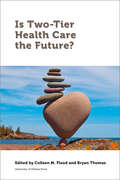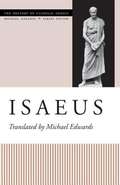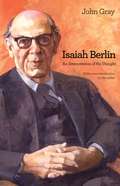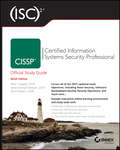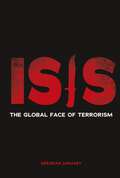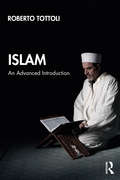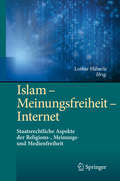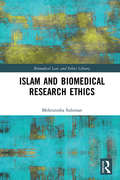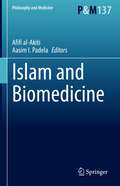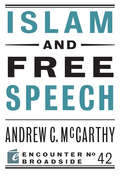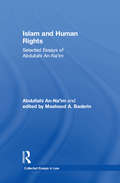- Table View
- List View
Is Everyone Really Equal?: An Introduction to Key Concepts in Social Justice Education
by Özlem Sensoy Robin DiAngelo<P>This is the new edition of the award-winning guide to social justice education. Based on the authors' extensive experience in a range of settings in the United States and Canada, the book addresses the most common stumbling blocks to understanding social justice. <P>This comprehensive resource includes new features such as: a chapter on intersectionality and classism, discussion of contemporary activisms (Black Lives Matter, Occupy, and Idle No More), material on White Settler societies and colonialism, pedagogical supports related to "common social patterns" and "vocabulary to practice using," and extensive updates throughout. <P>Accessible to students from high school through graduate school, Is Everyone Really Equal? is a detailed and engaging textbook and professional development resourcer presenting the key concepts in social justice education. The text includes many user-friendly features, examples, and vignettes to not just define but illustrate key concepts.
Is Everyone Really Equal? An Introduction to Key Concepts in Social Justice Education
by Özlem Sensoy Robin DiangeloThis practical handbook will introduce readers to social justice education, providing tools for developing "critical social justice literacy" and for taking action towards a more just society. Accessible to students from high school through graduate school, this book offers a collection of detailed and engaging explanations of key concepts in social justice education, including critical thinking, privilege, and White supremacy. Based on extensive experience in a range of settings in the United States and Canada, the authors address the most common stumbling blocks to understanding social justice. They provide recognizable examples, scenarios, and vignettes illustrating these concepts. This unique resource has many user-friendly features, including "definition boxes" for key terms, "stop boxes" to remind readers of previously explained ideas, "perspective check boxes" to draw attention to alternative standpoints, a glossary, and a chapter responding to the most common rebuttals encountered when leading discussions on concepts in critical social justice. There are discussion questions and extension activities at the end of each chapter, and an appendix designed to lend pedagogical support to those newer to teaching social justice education.
Is It Admissible?
by Ashley LipsonIs It Admissible? Are your objections ever overruled due to lack of specificity? Have you ever been too slow to object to inadmissible testimony? Do you waste valuable time poring through dense treatises just to see if a certain type of evidence is admissible? Do you struggle to find instant answers on evidence admissibility? Now there is help. Is It Admissible? by Ashley S. Lipson provides clear, concise, and supported answers to troublesome admissibility questions for virtually every type of evidence. Designed for use on the eve of trial or at counsel's table, Is It Admissible? provides everything you need for speedy and specific courtroom action: * Direct "yes or no" admissibility answers for each type of evidence * Quick explanation of the rule * Pattern questions for laying foundations * Admission strategies for the proponent * Exclusion arguments for the opponent * Model objection language, with responses * Color-coded tabs for quick-reference * Detailed topical index and table of cases * Coverage of civil and criminal law * Strategies for admission and exclusion * And much more The book is chock-full of novel arguments, proven strategies, and successful shortcuts.
Is Justice Possible?: The Elusive Pursuit of What is Right
by J. Paul Nyquist"Christians who take the Bible seriously dare not ignore this message. Paul Nyquist writes like an Old Testament prophet in modern America . . . &” — Leith Anderson, president, National Association of Evangelicals | Washington, DC&“Paul Nyquist brings a biblical focus and discerning look at why justice matters and how we might worktoward it.&”- Ed Stetzer, Billy Graham Chair | Wheaton College&“… [Explains] why justice often eludes us in this life, but also how we must work to achieve it as best we can.&”— Dr. Erwin W. Lutzer, pastor emeritus, The Moody Church | Chicago Why is justice so hard to come by?The innocent are convicted. The guilty get away. The scales tip toward the powerful, while the weak remain oppressed. If our world is so sophisticated, why is there so much injustice? What can believers do? Can we ever expect justice? Dr. Paul Nyquist, former president of Moody Bible Institute, addresses these questions and more in his new book, Is Justice Possible? In four parts he considers:Biblical and theological foundations of justice Obstacles to justice in human societyPractical steps for pursuing justice in political, personal, and public arenasThe hope of true justice upon Christ&’s returnAs police shootings and wrongful incarcerations raise increasing questions in the minds of Christians, Is Justice Possible? will seek to provide answers and establish biblical expectations.At its core, this is a book about an attribute of God. Rather than rely on our own ideas of justice, we must look to the One who made us and embodies justice perfectly. Only then can we pursue justice in purposeful, effective, eternal ways.
Is Justice Possible?: The Elusive Pursuit of What is Right
by J. Paul Nyquist"Christians who take the Bible seriously dare not ignore this message. Paul Nyquist writes like an Old Testament prophet in modern America . . . &” — Leith Anderson, president, National Association of Evangelicals | Washington, DC&“Paul Nyquist brings a biblical focus and discerning look at why justice matters and how we might worktoward it.&”- Ed Stetzer, Billy Graham Chair | Wheaton College&“… [Explains] why justice often eludes us in this life, but also how we must work to achieve it as best we can.&”— Dr. Erwin W. Lutzer, pastor emeritus, The Moody Church | Chicago Why is justice so hard to come by?The innocent are convicted. The guilty get away. The scales tip toward the powerful, while the weak remain oppressed. If our world is so sophisticated, why is there so much injustice? What can believers do? Can we ever expect justice? Dr. Paul Nyquist, former president of Moody Bible Institute, addresses these questions and more in his new book, Is Justice Possible? In four parts he considers:Biblical and theological foundations of justice Obstacles to justice in human societyPractical steps for pursuing justice in political, personal, and public arenasThe hope of true justice upon Christ&’s returnAs police shootings and wrongful incarcerations raise increasing questions in the minds of Christians, Is Justice Possible? will seek to provide answers and establish biblical expectations.At its core, this is a book about an attribute of God. Rather than rely on our own ideas of justice, we must look to the One who made us and embodies justice perfectly. Only then can we pursue justice in purposeful, effective, eternal ways.
Is Killing People Right?
by Allan C. Hutchinson'Great cases' are those judicial decisions around which the common law pivots. In a sequel to the instant classic Is Eating People Wrong?, this book presents eight new great cases from the United Kingdom, the United States and Australia. Written in a highly accessible yet rigorous style, it explores the social circumstances, institutions (lawyers, judges and courts) and ordinary people whose stories shaped the law. Across the courts' diverse and uncoordinated attempts to adapt to changing conditions and shifting demands, it shows the law as the living, breathing and down-the-street experience it really is. Including seminal cases in end of life, abortion and equal rights, this is an ideal introduction for students to legal history and jurisprudence.
Is Remote Warfare Moral?: Weighing Issues of Life and Death from 7,000 Miles
by Joseph O ChapaAmerica is at an important turning point. Remote warfare is not just a mainstay of post–9/11 wars, it is a harbinger of what lies ahead—a future of high-tech, artificial intelligence–enabled, and autonomous weapons systems that raise a host of new ethical questions. Most fundamentally, is remote warfare moral? And if so, why? Joseph O. Chapa, with unique credentials as Air Force officer, Predator pilot, and doctorate in moral philosophy, serves as our guide to understanding this future, able to engage in both the language of military operations and the language of moral philosophy. Through gripping accounts of remote pilots making life-and-death decisions and analysis of high-profile cases such as the killing of Iranian high government official General Qasem Soleimani, Chapa examines remote warfare within the context of the just war tradition, virtue, moral psychology, and moral responsibility. He develops the principles we should use to evaluate its morality, especially as pilots apply human judgment in morally complex combat situations. Moving on to the bigger picture, he examines how the morality of human decisions in remote war is situated within the broader moral context of US foreign policy and the future of warfare.
Is the Death Penalty Dying?
by Austin Sarat Jürgen MartschukatThis volume of "Studies in Law, Politics, and Society" presents a unique special issue "Is the Death Penalty Dying'. " Drawing together an array of distinguished scholars from political science, criminology, sociology, and law, this volume provides a compr
Is the Holocaust Unique?
by Alan S RosenbaumIn essays written specifically for this volume, distinguished contributors assess highly charged and fundamental questions about the Holocaust: Is it unique? How can it be compared with other instances of genocide? What constitutes genocide, and how should the international community respond? On one side of the dispute are those who fear that if the Holocaust is seen as the worst case of genocide ever, its character will diminish the sufferings of other persecuted groups. On the other side are those who argue that unless the Holocaust's uniqueness is established, the inevitable tendency will be to diminish its abiding significance. The editor's introductions provide the contextual considerations for understanding this multidimensional dispute and suggest that there are universal lessons to be learned from studying the Holocaust. The third edition brings this volume up to date and includes new readings on the Cambodian and Rwandan genocides, common themes in genocide ideologies, and Iran's reaction to the Holocaust. In a world where genocide persists and the global community continues to struggle with the implications of international crime, prosecution, justice, atonement, reparation, and healing, the issues addressed in this book are as relevant as ever.
Is There a Court for Gaza?
by Chantal Meloni Gianni TognoniThe 'Goldstone Report' of September 2009 started a critical debate at the international level. The Report raised serious allegations of grave violations of international law with regard to the Israeli attack on Gaza of 27 December 2008 - 18 January 2009, amounting to possible war crimes and crimes against humanity. The UN General Assembly and the Human Rights Council, amidst high political pressure, endorsed the Report's recommendations, calling for prompt and proper investigations to ensure accountability and justice for the victims. Given the lack of proper investigations at the national level, international justice mechanisms are now needed. Indeed, the ICC opened a preliminary examination of the situation but difficulties arose because of the uncertain status of the occupied Palestinian territory. The issue of the existence of a State of Palestine is extremely actual and still unsolved at the UN level. With a foreword by prof. William Schabas, the book collects contributions by renowned international law professors as Eric David, John Dugard, Richard Falk and many other distinguished scholars and lawyers, and brings together for the first time essential documentation on the 'Gaza conflict'. The underlying question, whether there is a court for Gaza, can be seen as a test case for international justice, and shed a light on the role of international institutions in the difficult combination of law and politics that connotes international justice. Useful for all those interested in the Israeli-Palestinian conflict, such as international and criminal law scholars, and human rights and humanitarian organizations.
Is There a Duty to Die?: And Other Essays in Bioethics (Reflective Bioethics)
by John HardwigFirst published in 2000. Routledge is an imprint of Taylor & Francis, an informa company.
Is this Cell a Human Being?
by Antoine Suarez Joachim HuarteThe central question of this book is whether or not particular cell entities of human origin ought to be considered human beings. The answer is crucial for making moral decisions for or against research and experimentation. Experts in the field discuss the production of embryonic-like pluripotent stem cells by altered nuclear transfer, parthenogenesis and reprogramming of adult somatic cells. They thoroughly analyse the biological and moral status of different cell entities, such as human stem cells, embryos and human-animal hybrid embryos, and make a decisive step towards establishing final criteria for what constitutes a human being. The topic is challenging in nature and of broad interest to all those concerned with current bioethical thought on embryonic human life and its implications for society.
Is This Wi-Fi Organic?: A Guide to Spotting Misleading Science Online
by Dave FarinaHow to Separate Real Scientific Truths from Fake News“Scientific literacy is our best defense in an age of increasing disinformation.” ?Kellie Gerardi, Aerospace Professional and Author of Not Necessarily Rocket Science #1 New Release in Safety & First Aid, Education, Essays & Commentary, Scientific Research, and EthicsWe live in the internet age, where scams, frauds, fake-news, fake stories, fake science, and false narratives are everywhere. With the knowledge base gained from Dave Farina’s simple explanations, learn to spot misinformation and lies on the internet before they spot you.Is This Wi-Fi Organic? is a playful investigation of popular opinions and consumer trends that permeate our society. The organic craze has taken hold of grocery culture despite most being unable to define the term. Healers and quantum mystics of every flavor are securing their foothold alongside science-based medicine, in an unregulated and largely unchallenged landscape of unsubstantiated claims. Anti-science mentality is growing. Misleading popular opinions are used to sell you products and services that range from ineffectual to downright dangerous.Learn how to separate fact from fiction. Dave Farina, author and science communicator from the YouTube channel Professor Dave Explains offers easy-to-read lessons on basic scientific principles everyone should understand, and then uses them to expose threads of confusion among the public.Learn:The real science behind semi-controversial health issues like drugs and vaccinesWhat energy actually is, and how we use it each and every dayA core of scientific knowledge that empowers you to spot misinformation, fake-news, fake science, and increase your critical thinking skillsReaders captivated by the scientific and critical thinking teachings in science books like Brief Answers to the Big Questions by Stephen Hawking, The Demon-Haunted World, or Calling Bullshit, will love Is This Wi-Fi Organic?
Is Two-Tier Health Care the Future? (Law, Technology and Media)
by Sara Allin Sarah Barry Sara Burke Danielle Dawson Lorraine Frisina Doetter Stephen Duckett Noushon Farmanara Vanessa Gruben Jeremiah Hurley Martha Jackman Bridget Johnston Gregory P. Marchildon Fiona McDonald Rachel McKay Jonathan Mullen Zeynep Or Aurélie Pierre Amélie Quesnel-Vallée David Rudoler Achim Schmid Rikke Siersbaek Stephen Thomas Carolyn Hughes TuohyCanadians are deeply worried about wait times for health care. Entrepreneurial doctors and private clinics are bringing Charter challenges to existing laws restrictive of a two-tier system. They argue that Canada is an outlier among developed countries in limiting options to jump the queue. This book explores whether a two-tier model is a solution. In Is Two-Tier Health Care the Future?, leading researchers explore the public and private mix in Canada, Australia, Germany, France, and Ireland. They explain the history and complexity of interactions between public and private funding of health care and the many regulations and policies found in different countries used to both inhibit and sometimes to encourage two-tier care, such as tax breaks. This edited collection provides critical evidence on the different approaches to regulating two-tier care across different countries and what could work in Canada. This book is published in English.
Isaeus
by Michael EdwardsThis is the eleventh volume in the Oratory of Classical Greece. This series presents all of the surviving speeches from the late fifth and fourth centuries BC in new translations prepared by classical scholars who are at the forefront of the discipline. These translations are especially designed for the needs and interests of today's undergraduates, Greekless scholars in other disciplines, and the general public. Classical oratory is an invaluable resource for the study of ancient Greek life and culture. The speeches offer evidence on Greek moral views, social and economic conditions, political and social ideology, law and legal procedure, and other aspects of Athenian culture that have recently been attracting particular interest: women and family life, slavery, and religion, to name just a few. The orator Isaeus lived during the fourth century BC and was said to be the teacher of Demosthenes, Athens' most famous orator. Of the fifty or more speeches he is believed to have written, eleven survive in whole, one as a large fragment, and others as smaller fragments. This volume presents all the surviving works of Isaeus. The speeches mainly deal with inheritances and are a vital source of information regarding Greek law in this important area. In addition to translating the speeches, Michael Edwards provides a general introduction to Isaeus and Athenian inheritance law, as well as specific introductions and notes for each speech.
Isaiah Berlin: An Interpretation of His Thought
by John GrayIsaiah Berlin (1909-1997) was the greatest intellectual historian of the twentieth century. But his work also made an original and important contribution to moral and political philosophy and to liberal theory. In 1921, at the age of eleven, Isaiah Berlin arrived in England from Riga, Latvia. By the time he was thirty he was at the heart of British intellectual life. He has remained its commanding presence ever since, and few would dispute that he was one of Britain's greatest thinkers. His reputation extends worldwide--as a great conversationalist, intellectual historian, and man of letters. He has been called the century's most inspired reader. Yet Berlin's contributions to thought--in particular to moral and political philosophy, and to liberal theory--are little understood, and surprisingly neglected by the academic world. In this book, they are shown to be animated by a single, powerful, subversive idea: value-pluralism which affirms the reality of a deep conflict between ultimate human values that reason cannot resolve. Though bracingly clear-headed, humane and realist, Berlin's value-pluralism runs against the dominant Western traditions, secular and religious, which avow an ultimate harmony of values. It supports a highly distinctive restatement of liberalism in Berlin's work--an agnostic liberalism, which is founded not on rational choice but on the radical choices we make when faced with intractable dilemmas. It is this new statement of liberalism, the central subject of John Gray's lively and lucid book, which gives the liberal intellectual tradition a new lease on life, a new source of life, and which comprises Berlin's central and enduring legacy. In a new introduction, Gray argues that, in a world in which human freedom has spread more slowly than democracy, Berlin's account of liberty and basic decency is more instructive and useful than ever.
(ISC)2 CISSP Certified Information Systems Security Professional Official Study Guide
by Mike Chapple James Michael Stewart Darril GibsonCISSP Study Guide - fully updated for the 2021 CISSP Body of Knowledge (ISC)2 Certified Information Systems Security Professional (CISSP) Official Study Guide, 9th Edition has been completely updated based on the latest 2021 CISSP Exam Outline. This bestselling Sybex Study Guide covers 100% of the exam objectives. You'll prepare for the exam smarter and faster with Sybex thanks to expert content, knowledge from our real-world experience, advice on mastering this adaptive exam, access to the Sybex online interactive learning environment, and much more. Reinforce what you've learned with key topic exam essentials and chapter review questions. The three co-authors of this book bring decades of experience as cybersecurity practitioners and educators, integrating real-world expertise with the practical knowledge you'll need to successfully pass the CISSP exam. Combined, they've taught cybersecurity concepts to millions of students through their books, video courses, and live training programs. Along with the book, you also get access to Sybex's superior online interactive learning environment that includes: Over 900 new and improved practice test questions with complete answer explanations. This includes all of the questions from the book plus four additional online-only practice exams, each with 125 unique questions. You can use the online-only practice exams as full exam simulations. Our questions will help you identify where you need to study more. Get more than 90 percent of the answers correct, and you're ready to take the certification exam. More than 700 Electronic Flashcards to reinforce your learning and give you last-minute test prep before the exam A searchable glossary in PDF to give you instant access to the key terms you need to know for the exam New for the 9th edition: Audio Review. Author Mike Chapple reads the Exam Essentials for each chapter providing you with 2 hours and 50 minutes of new audio review for yet another way to reinforce your knowledge as you prepare. Coverage of all of the exam topics in the book means you'll be ready for: Security and Risk Management Asset Security Security Architecture and Engineering Communication and Network Security Identity and Access Management (IAM) Security Assessment and Testing Security Operations Software Development Security
ISIS: The Global Face of Terrorism
by Brendan JanuaryThe Islamic State in Iraq and Syria, or ISIS, emerged in the Middle East during the first decade of the 2000s. The group vows to wage violent jihad, or holy war, on those who do not adhere to its extremist interpretation of Islamic law. ISIS conquers territory and rules savagely. ISIS terrorists manipulate social media brilliantly, shocking viewers around the globe with brutal video footage. Government leaders and agencies all over the world are working to prevent the next ISIS attack. How can nations combat ISIS? Can it be defeated with military force? This in-depth investigation tackles these and other thorny issues related to the twenty-first-century face of global terrorism.
Islam: An Advanced Introduction
by Roberto TottoliExploring complex relations between Muslim visions and critical stances, this textbook is a compact introduction to Islam, dealing with the origins of its forms, from early developments to contemporary issues, including religious principles, beliefs and practices. The author’s innovative method considers the various opposing theories and approaches between the Islamic tradition and scholars of Islam. Each topic is accompanied by up-to-date bibliographical references and a list of titles for further study, while an exhaustive glossary includes the elementary notions to allow in-depth study. Part I outlines the two founding aspects, the Qur’an and Prophet Muhammad, highlighting essential concepts, according to Islamic religious discourse and related critical issues. In Part II the emergence of the religious themes that have characterised the formation of Islam are explored in terms of historical developments. Part III, on contemporary Islam, examines the growth of Islam between the end of the Middle Ages and the beginning of the modern age. Advanced readers, already familiar with the elementary notions of Islam and religious studies will benefit from Islam that explores the development of religious discourse in a historical perspective. This unique textbook is a key resource for post-graduate researchers and academics interested in Islam, religion and the Middle East.
Islam – Meinungsfreiheit – Internet: Staatsrechtliche Aspekte der Religions-, Meinungs- und Medienfreiheit
by Lothar HäberleDas Themenspektrum dieses Buches erscheint weit gespannt. Meinungsfreiheit bildet das Scharnier zwischen Islam und Internet, hat mit beiden gemeinsame Konfliktfelder. In diesem Spannungsfeld erläutern Staatsrechtslehrer wie Udo Steiner, Michael Sachs und Klaus F. Gärditz Aspekte der Meinungsfreiheit wie auch der Religions-, Kunst- und Pressefreiheit. Aber gibt es auch Schnittmengen zwischen Islam und Internet? Die geistige, publizistische und politische Auseinandersetzung um den Islam in Deutschland und Europa findet zu guten Teilen im Internet statt. Dabei wirkt das Internet als Konfliktverstärker: Dessen anonyme Nutzung bewirkt mangelnde Zurechenbarkeit und Verantwortlichkeit für Duktus und Inhalt des eigenen Beitrags. Unsichtbar bleibt auch der Kritisierte. So wirkt das Internet enthemmend. Wie Islamgegner oder -feinde das Internet nutzen, so gleichermaßen Islamisten: zu Propaganda, zur Anwerbung von IS-Sympathisanten oder -Kämpfern, zur Vorbereitung von Anschlägen und anderen Straftaten. Spannen beide Seiten das Internet für ihre gegenläufigen Zwecke ein, verstärken sich die Konflikte erheblich. Das Internet-Phänomen „Echokammer“ (Abkapselung Gleichgesinnter) trägt erheblich bei zu wachsender Sprachlosigkeit zwischen verschiedenen gesellschaftlichen Gruppen. Hate Speech, massive Beleidigungen, Drohungen verschärfen die Gegnerschaft. Zentrifugale Kräfte der Gesellschaft werden verstärkt, nicht nur sichtbarer. In mehreren Beiträgen wird hierbei die Rolle des Internets untersucht, werden Ansatzpunkte möglicher Regulierungen sowie problemgerechte Lösungen aufgezeigt.
Islam and Biomedical Research Ethics (Biomedical Law and Ethics Library)
by Mehrunisha SulemanThis book is a contribution to the nascent discourse on global health and biomedical research ethics involving Muslim populations and Islamic contexts. It presents a rich sociological account about the ways in which debates and questions involving Islam within the biomedical research context are negotiated - a perspective which is currently lacking within the broader bioethics literature. The book tackles some key understudied areas including: role of faith in moral deliberations within biomedical research ethics, the moral anxiety and frustration experienced by researchers when having to negotiate multiple moral sources and how the marginalisation of women, the prejudice and abuse faced by groups such as sex workers and those from the LGBT community are encountered and negotiated in such contexts. The volume provides a valuable resource for researchers and scholars in this area by providing a systematic review of ethical guidelines and a rich case-based account of the ethical issues emerging in biomedical research in contexts where Islam and the religious moral commitments of Muslims are pertinent. The book will be essential for those conducting research in low and middle income countries that have significant Muslim populations and for those in Muslim-minority settings. It will also appeal to researchers and scholars in religious studies, social sciences, philosophy, anthropology and theology, as well as the fields of biomedical ethics, Islamic ethics and global health..
Islam and Biomedicine (Philosophy and Medicine #137)
by Afifi Al-Akiti Aasim I. PadelaThis book showcases multidisciplinary research at the intersection of the Islamic tradition and biomedicine. Within this broad area of scholarship, this book considers how Islamic theological constructs align with the science and practice of medicine, and in so doing offer resources for bridging the challenges of competing ontological visions, varied epistemic frameworks, and different theologies of life and living among the bodies of knowledge. By bringing together theologians, medical practitioners and intellectual historians, the book spurs deeper conversations at the intersection of these fields and provides fundamental resources for further dedicated research.
Islam and English Law
by Robin Griffith-JonesFormer Archbishop of Canterbury Rowan Williams triggered a storm of protest when he suggested that some accommodation between British law and Islam's shari'a law was 'inevitable'. His foundational lecture introduced a series of public discussions on Islam and English Law at the Royal Courts of Justice and the Temple Church in London. This volume combines developed versions of these discussions with new contributions. Theologians, lawyers and sociologists look back on developments since the Archbishop spoke and forwards along trajectories opened by the historic lecture. The contributors provide and advocate a forward-looking dialogue, asking how the rights of all citizens are honoured and their responsibilities met. Twenty specialists explore the evolution of English law, the implications of Islam, shari'a and jihad and the principles of the European Convention on Human Rights, family law and freedom of speech. This book is for anyone interested in the interaction between religion and secular society.
Islam and Free Speech
by Andrew C MccarthyIn January 2015, Muslim terrorists massacred cartoonists and writers at the Paris offices of the satirical magazine Charlie Hebdo, proclaiming to be avenging Islam's prophet. The rampage, which included the murders of hostages at a kosher market, prompted global leaders and throngs of citizens to rally in support of free expression. But was the support genuine?In this Broadside, Andrew C. McCarthy explains how leading Islamists have sought to supplant free expression with the blasphemy standards of Islamic law, gaining the support of the U.S. and other Western governments. But free speech is the lifeblood of a functioning democratic society, essential to our capacity to understand, protect ourselves from, and ultimately defeat our enemies.
Islam and Human Rights: Selected Essays of Abdullahi An-Na'im (Collected Essays in Law)
by Abdullahi An-Na'im edited by BaderinThe relationship between Islam and human rights forms an important aspect of contemporary international human rights debates. Current international events have made the topic more relevant than ever in international law discourse. Professor Abdullahi An-Na'im is undoubtedly one of the leading international scholars on this subject. He has written extensively on the subject and his works are widely referenced in the literature. His contributions on the subject are however scattered in different academic journals and book chapters. This anthology is designed to bring together his academic contributions on the subject under one cover, for easy access for students and researchers in Islamic law and human rights.
